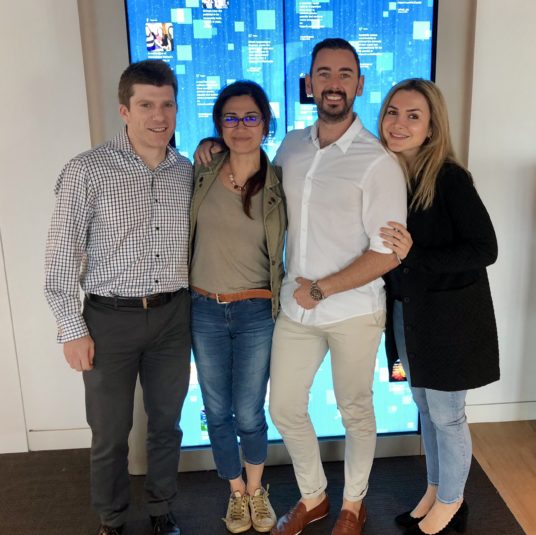Whenever someone with a special need or disability starts something new (for example, a job or a sport), they always have to spend a lot of time explaining their needs and requirements to others. How could technology help them with that? This was the scenario and question recently tackled by the Built to Roam / Clinic to Cloud team taking part in the 2018 Hack 4 Good event in Sydney. Hack 4 Good is an annual hackathon organised by Microsoft with the aim of using technology to improve people’s lives.
This year’s event was hosted by PwC, and coordinated with Social Ventures Australia (SVA), with a focus on helping people with disabilities. Built to Roam was invited by Microsoft to partner with Clinic to Cloud, as mobile application development experts – and Nick Randolph, our co-founder and technical lead, was our representative.
Passbook for sharing information
The Built to Roam / Clinic to Cloud team was among eight teams taking on the challenge of utilising technology to enable inclusivity and accessibility for people with disabilities. Participants in the Hack 4 Good challenge had to explore one of three situations:
- A passbook to enable people with disabilities to easily share information about their disability and needs without having to constantly explain or be interpreted.
- Helping people in remote locations communicate better despite distance and limited connectivity.
- A knowledge bank of available technology and services to help people with disabilities, along with service providers and employers gain easy access to the latest information.
The Built to Roam / Clinic to Cloud team opted for the first situation. The team envisaged the situation of a person with a disability starting something new and needing to communicate their requirements. In the first instance the focus was on an employment setting and starting a new job.
An app provides a tool for sharing while retaining control
The team spent the first one and a half days of the two-day program focusing on R&D. “What we found is it’s not just about the individual,” says Nick Randolph. “From an employment perspective, it’s about the organisation as well – do they have ramps, lifts, etc.”
A number of people with special needs were present at the hackathon and gave insights into the challenges they would face when starting a new job. “They said it isn’t just about communicating their needs, it’s about having to demonstrate that they can do the job, with minimal impact or disruption,” says Nick.
The solution the team created during the Hack 4 Good event – and won second place for – was an app that can pre-empt some of the questions and challenges people with disabilities face. For example, the new employee with a disability might use the app to tell new colleagues that, “I use a screen reader or a guide dog to help me get around. I may need some assistance getting started, but after that I’ll be self-sufficient.”
How it works
‘Share.Life’ (a working title) is a personal passport app that documents and shares personal needs, enabling someone with a disability to educate others with ease, and feel more empowered to live their life without exclusion.
The person enters their information via a sequence of simple screens. While designing Share.Life the Built to Roam / Clinic to Cloud team focused heavily on privacy and control of information. “We spent a lot of time considering the needs and requirements,” says Nick. “The info you want to share and make available in a social setting is different to what you share with your colleagues and boss.”
While it identifies and groups all the core needs, Share.Life also allows for free text. So, for example, a father who is blind might have a helper who takes his children for swimming lessons. The helper needs to know which bathers are for which child. Share.Life can have descriptions and pictures of the bathers to make it easier for the helper.
All the user has to do is hit ‘share’ and a unique URL is generated which can then be shared by any of the standard sharing means, including text, email, messenger etc. The person receiving the link then logs-in via a web interface using an account or perhaps their Facebook login – this ensures the user always retains control of the information shared and can revoke access at any time.
The immense opportunity of technology in helping those with special needs
“This version of Share.Life was just the beginning, focussing on work. In the future, we hope it can be extended to cater for other situations, such as joining a sports team or other social group,” says Nick.
“There’s such an immense opportunity for technology to make a difference to people’s lives,” he says. “Hack 4 Good was such a great opportunity to get in a room with a bunch of passionate people to work on some of these problems.”
“Being a part of the event made me realise how much work needs to go into helping these individuals and how little is actually done. Some 20% of Australians are living with a disability, and if we don’t design inclusively, we are effectively excluding 20% of our community.”
If you have a desire to build a solution to help those struggling with a disability, or want to make your application more accessible, Contact us to see how we can help. Alternatively you can read more Insights covering cloud and cross-platform app development.

